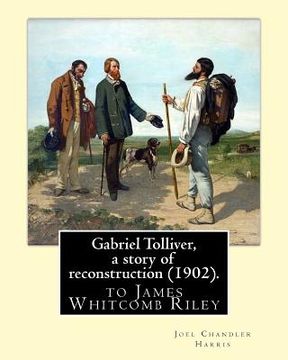Gabriel Tolliver, a story of reconstruction (1902). By: Joel Chandler Harris: to James Whitcomb Riley (October 7, 1849 - July 22, 1916) was an America (in English)
Synopsis "Gabriel Tolliver, a story of reconstruction (1902). By: Joel Chandler Harris: to James Whitcomb Riley (October 7, 1849 - July 22, 1916) was an America (in English)"
Joel Chandler Harris (December 9, 1848 - July 3, 1908) was an American journalist, fiction writer, and folklorist best known for his collection of Uncle Remus stories. Harris was born in Eatonton, Georgia, where he served as an apprentice on a plantation during his teenage years. He spent the majority of his adult life in Atlanta working as an associate editor at the Atlanta Constitution. Harris led two professional lives: as the editor and journalist known as Joe Harris, he supported a vision of the New South with the editor Henry W. Grady (1880-1889), stressing regional and racial reconciliation after the Reconstruction era. As Joel Chandler Harris, fiction writer and folklorist, he wrote many 'Brer Rabbit' stories from the African-American oral tradition and helped to revolutionize literature in the process.Harris created the first version of the Uncle Remus character for the Atlanta Constitution in 1876 after inheriting a column formerly written by Samuel W. Small, who had taken leave from the paper. In these character sketches, Remus would visit the newspaper office to discuss the social and racial issues of the day. By 1877 Small had returned to the Constitution and resumed his column. Harris did not intend to continue the Remus character. But when Small left the paper again, Harris reprised Remus. He realized the literary value of the stories he had heard from the slaves of Turnwold Plantation. Harris set out to record the stories and insisted that they be verified by two independent sources before he would publish them. He found the research more difficult given his professional duties, urban location, race and, eventually, fame.[13] On July 20, 1879, Harris published "The Story of Mr. Rabbit and Mr. Fox as Told by Uncle Remus" in the Atlanta Constitution. It was the first of 34 plantation fables that would be compiled in Uncle Remus: His Songs and His Sayings (1880). The stories, mostly collected directly from the African-American oral storytelling tradition, were revolutionary in their use of dialect, animal personages, and serialized landscapes.The Uncle Remus stories garnered critical acclaim and achieved popular success well into the 20th century. Harris published at least twenty-nine books, of which nine books were compiled of his published Uncle Remus stories, including Uncle Remus: His Songs and His Sayings (1880), Nights with Uncle Remus (1883), Uncle Remus and His Friends (1892), The Tar Baby and Other Rhymes of Uncle Remus (1904), Told by Uncle Remus: New Stories of the Old Plantation (1905), Uncle Remus and Brer Rabbit (1907). The last three books written by Joel Chandler Harris were published after his death which included Uncle Remus and the Little Boy (1910), Uncle Remus Returns (1918), and Seven Tales of Uncle Remus (1948). The tales, 185 in sum, became immensely popular among both black and white readers in the North and South. Few people outside of the South had heard accents like those spoken in the tales, and the dialect had never been legitimately and faithfully recorded in print. To Northern and international readers, the stories were a "revelation of the unknown."Mark Twain noted in 1883, "in the matter of writing [the African-American dialect], he is the only master the country has produced.".. James Whitcomb Riley (October 7, 1849 - July 22, 1916) was an American writer, poet, and best-selling author. During his lifetime he was known as the "Hoosier Poet" and "Children's Poet" for his dialect works and his children's poetry respectively. His poems tended to be humorous or sentimental, and of the approximately one thousand poems that Riley authored, the majority are in dialect. His famous works include "Little Orphant Annie" and "The Raggedy Man".

